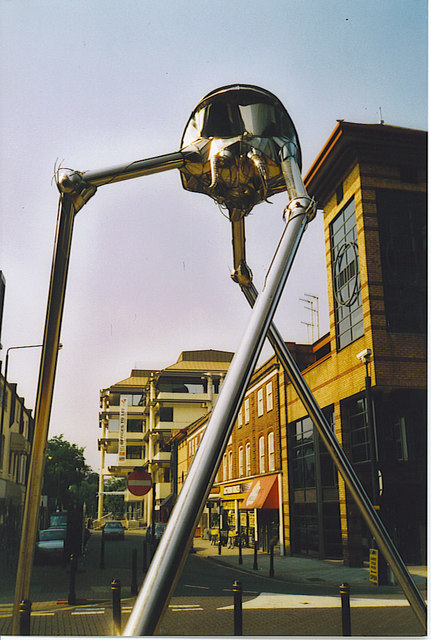Woking
H.G. Wells
by Beth Palmer

The journalist and novelist H.G. Wells (1866-1946) is best known for his science fiction novels featuring angels, Martians, time-travellers, animal hybrids and revolutionaries. Wells’s imagination was fantastical but always rooted in some form of scientific possibility and he became known as ‘the father of science fiction’. It was during 1895 and 1896, whilst living in Woking, that the majority of these sci-fi stories were written and published: The Time Machine, The Wonderful Visit, The Island of Doctor Moreau, The Wheels of Chance, The Invisible Man, When the Sleeper Wakes and, most famously, The War of the Worlds.
The War of the Worlds imagines a hostile alien invasion spreading from a landing site on Horsell Common to threaten humanity. Wells learnt to cycle in and around Woking and writes in his autobiography of “marking down suitable places and people for destruction by my Martians” as he rode around the town. His knowledge of the area is transferred onto the narrator of the novel who provides us with the ordinary details of suburban living (like his familiarity with local shopkeepers and railway timetables) which provides a stark contrast to the deeply disturbing and other-worldly aliens. The narrator, although stunned by the aliens’ arrival, proves himself a survivor and navigates through Surrey, narrowly escaping from an intense battle at Weybridge, and surviving in a desolate and dystopian London until the Martians succumb to deadly bacteria.
Wells lived in Woking with Amy Catherine Robbins (known as Jane), a former student who he married in 1895 having divorced his first wife. The couple had moved out of London for the sake of Wells’s health. Woking was, in the 1890s, quiet and un-polluted in comparison to central London. Up to this point he had worked as a draper, a pharmacist and a teacher and he had undertaken serious study in the natural sciences. Writing for a living meant he was unafraid to give his opinion, and he contributed non-fiction pieces to newspapers and journals like the Pall Mall Gazette during his time in Woking. He would continue to write articles on history, science, and politics alongside his fiction throughout his career and was a notable member of the Fabian Society. As his books became popular he gained renown and local papers, despite describing him as a ‘pale faced student’, also saw him as ‘a coming man’ during his time living in Woking. He went onto to become one of the most influential writers and thinkers of twentieth-century Britain.
You can follow Well’s footsteps via the Wells in Woking Heritage Trail created by Wells in Woking. The walk takes you to Wells’s house, past the Martian statue in the centre of Woking and around the sandpits at Horsell Common were the Martians first land in The War of the Worlds.

Share your thoughts